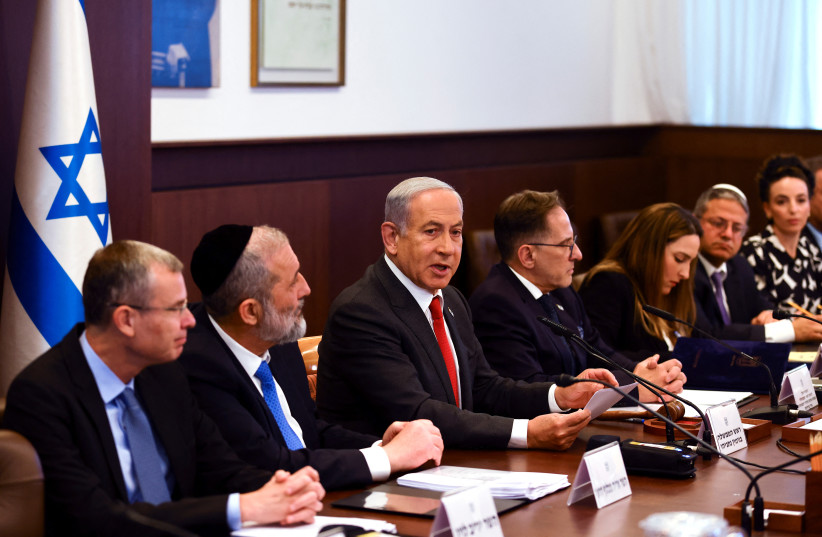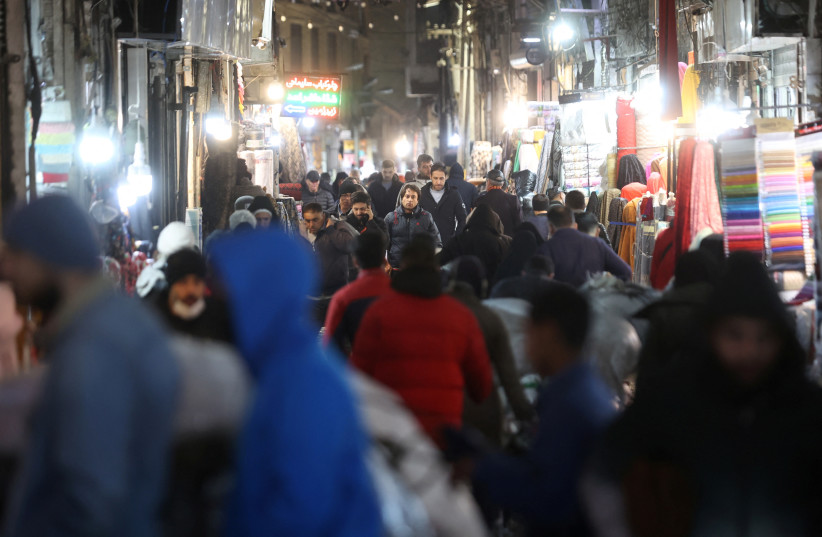Israel salutes the brave Iranians fighting for their lives, Prime Minister Benjamin Netanyahu said as he joined world leaders in condemning the Islamic Republic’s execution of protesters.
“Over the weekend, the terrorist regime in Iran executed two young Iranian citizens who demonstrated against the tyranny of the government. Israel strongly condemns this criminal murder,” Netanyahu said at the start of his weekly cabinet.
“We salute the Iranian citizens who are valiantly fighting for their freedom. They have sacrificed their lives for basic civil rights,” Netanyahu said.
"We salute the Iranian citizens who are valiantly fighting for their freedom"
Prime Minister Benjamin Netanyahu

“Their deaths have revealed to the whole world the true and ugly face of the oppressive regime in Tehran, a regime that threatens its citizens, the countries in the region and the peace of the entire world,” he stated.
Netanyahu says, 'I told you so'
Netanyahu said he had been warning against the Islamic Republic for over two decades, but now the truth is on display and the international community including governments around the world better understand this threat.
He spoke out after Iran on Saturday hanged two men for allegedly killing a member of the security forces during nationwide protests that followed the death of 22-year-old Kurdish-Iranian woman Mahsa Amini on September 16.
The two men executed on Saturday had been convicted of killing a member of the Basij paramilitary force militia. Three others have been sentenced to death in the same case, while 11 received prison sentences.
"Mohammad Mehdi Karami and Seyyed Mohammad Hosseini, principal perpetrators of the crime that led to the unjust martyrdom of Ruhollah Ajamian were hanged this morning," the judiciary said in a statement carried by the official IRNA news agency said on Saturday.
The latest executions bring to four the number of protesters officially known to have been executed in the aftermath of the unrest.
EU, US, UK also condemn Iranian executions
The European Union's top diplomat on Saturday condemned the executions and called on Iran to immediately stop carrying out death sentences against protestors, and annul existing sentences.
"This is yet another sign of the Iranian authorities' violent repression of civilian demonstrations," Josep Borrell said in a statement.
The US special envoy to Iran, Robert Malley, also condemned the executions, saying they followed "sham trials." "These executions must stop," Malley said on Twitter.
British Foreign Minister James Cleverly on Saturday condemned the executions and urged Iran to "immediately end the violence against its own people."
The French foreign ministry called the executions "revolting" and urged Iranian authorities to heed the "legitimate aspirations of the Iranian people."
The Dutch government said it would summon Iran's ambassador to the Netherlands for the second time in a month to raise its concerns over the execution of demonstrators, and urged other EU countries to do the same.
Amnesty International said last month that Iranian authorities are seeking the death penalty for at least 26 others in what it called "sham trials designed to intimidate protesters."
It said all of those facing death sentences had been denied the right to adequate defense and access to lawyers of their choosing. Rights groups say defendants have instead had to rely on state-appointed attorneys who do little to defend them.
Amnesty said the court that convicted Karami, a 22-year-old karate champion, relied on forced confessions.
Hosseini's lawyer Ali Sharifzadeh Ardakani said in a December 18 tweet that Hosseini had been severely tortured and that confessions extracted under torture had no legal basis.
He said Hosseini was beaten with his hands and feet tied up, kicked in the head until he passed out, and subjected to electric shocks on different parts of his body.
Iran denies that confessions are extracted under torture.

Mahsa Amini died in custody in September after being arrested by morality police enforcing the Islamic Republic's mandatory dress code laws. The protests that ensued represent one of the biggest challenges to the Islamic Republic since its establishment in 1979.
Supreme Leader Ayatollah Ali Khamenei on Saturday named hardline police official Ahmad Reza Radan as the new national police commander, state media reported.
Radan, who was placed under US sanctions in 2010 for human rights violations, has frequently called for strict enforcement of the country's Islamic dress code for women during his earlier police positions.
The Basij force, affiliated with Iran's powerful Revolutionary Guards, has been behind much of the crackdown against protesters.
Iran, which has blamed the unrest on its foreign foes including the United States, sees its crackdown of protests as preserving national sovereignty.
The rights group HRANA said that as of Friday, 517 protesters had been killed during unrest, including 70 minors. It said 68 members of the security forces had also been killed.
As many as 19,262 protesters are believed to have been arrested, it said.
Iranian officials have said that up to 300 people, including members of the security forces, have died.
The first protester known to be executed was 23-year-old Mohsen Shekari on December 8, less than three months after his arrest. He was accused of burning a trash bin, blocking a road, stabbing a member of the Basij militia with a machete and threatening public safety.
Majid Reza Rahnavard, 23, was hanged from a crane in public on December 12 in the northeastern city of Mashhad, less than a month after his arrest. He was accused of stabbing to death two Basij members and wounding four other people in Mashhad.
